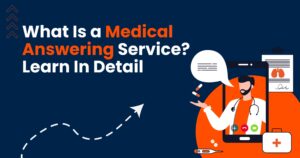The healthcare industry is constantly evolving and adopting effective leadership in healthcare is vital to serving patients and other communities. The post-pandemic world reshaped the healthcare sector and highlighted the significance of innovative healthcare leaders in the robust formulation of actionable solutions. The leadership types and styles are different and not confined to the head of the department or the practice manager in a medical facility.
Leadership is more like an art where the health-care stakes are incredibly high and lives are on the line. If you want to discover more about leadership in healthcare to understand the ability to manage people, systems and even financial resources, let this article help you walk through the nitty-gritty of this topic.
What is Healthcare Leadership? | A Brief Overview
A forward-thinking approach nurtured by power to manage a team effectively defines what makes a quality leader. Healthcare leadership is about leading the people and organizations in a complex healthcare setup. Quality of care and leadership build an environment where physicians, nurses, administrative staff, health professionals and patients can flourish.
More precisely, healthcare leadership is about challenging the status quo and creating opportunities and solutions to emerging problems.
In 2020, over 106,000 people were ready and waiting for organ donation. 17 people died per day waiting for organs, healthcare leaders made strong decisions about who to grade on the top for life-saving surgery.
Importance of Leadership in Healthcare
Effective leadership development in healthcare is imperative, especially when considering the expense of modern healthcare accessibility. Let’s explore the key points.
Produces Adaptable Leaders
The COVID-19 pandemic taught adaptability to the healthcare industry. American Psychological Association in 2020 identified seven critical leadership qualities indispensable for combatting the pandemic.
- Efficient stress management
- Ready to serve as role models
- Empathy, optimism and transparency when sharing information
- Building trust with dependability and expertise
- Honesty and collaborative communication
- Ready for genuine feedback
Fosters Forward Thinking
Leadership involves much more than day-to-day business operations. The futuristic approach demands leadership in healthcare management to improve care delivery services. Normally healthcare leadership and management terms are used as synonyms. World Population Review claims that the US has a higher healthcare budget than any other country on the map. More people in the US have healthcare insurance, making their healthcare system more dependent on access to insurance coverage. Peterson-KFF Health System Tracker issues a report that spills the truth as follows.
- The United States has a higher pregnancy-related mortality rate.
- More congestive heart failure and diabetes rate.
- Higher reported treatment errors.
Effective leadership and healthcare affordability help to improve the Medicare system.
Builds Innovative Mentorship
An equipped leadership is the soul of the system as it keeps the engine moving forward. Forbes Report stated that in 2021 the healthcare workforce lost approximately 333, 942 providers. This statistic spotlights the debilitated situation of healthcare professionals. The healthcare industry needs brainy leaders and innovative personnel to identify and fix the glitches without delay. Good leaders perform two things differently compared to spoiled leaders.
Identification
According to a report, almost 57% of healthcare professionals believe that highly monotonous tasks ultimately lead to huge burnout. True leaders timely recognize the problem and propose the potential solution before they miss the chance.
Innovation
Great healthcare leaders leverage top-notch technology and automation to perform repetitive tasks for time and cost reduction. They try to find precise solutions to ameliorate the overall experience and deliver the best to the patient.
Enhances Care Standard
Quality healthcare serves as glue to uphold the intricate web of medical services. Unlike traditional healthcare systems where the prime focus might be on revenue generation, modern leadership in healthcare management prioritizes quality patient care to resolve critical issues before unnecessary delays. Great leaders facilitate responsive communication with efficient results to boost the care standard.
What Makes a Good Leader in Healthcare?
A leadership role in the healthcare industry demands a particular set of traits and attributes to withstand the challenges. Every leader yearns to stand out from the crowd but it requires a leadership degree and extensive experience to add value to the skillset. Knowledge-based exposure is mandatory for a healthcare leader to thrive in this ever-changing ecosystem. Let’s unpack the key leadership skills.Counselling
An effective leader not only leads the team but also fosters the leadership qualities in others to help them grow further.Challenging Existing Situation
Leaders never settle on the status quo. They always work on the opportunities to innovate and improve.Spreading Awareness
Effective leaders not only offer mentorship to individuals but also educate them on key skills outside of their direct influence.Humility
Healthcare leaders are always ready to accept feedback or criticism. Mistakes are often inevitable in healthcare. A good leader always admits their mistakes, skill or expertise gaps.Adept at Working Smarter
Instead of working harder, an effective leader leans on smart options to save maximum resources such as time, money, and equipment, to resolve the problems and deliver quality results.Opening Gateways for Others
Leaders have a keen eye on the future. Instead of current improvement or merely personal growth, a good leader prioritizes the next generation of healthcare professionals to help them obtain leadership traits.How to Handle Stressful Healthcare Environments?
The healthcare industry can face intricate challenges and handling a stressful workplace environment can be an uphill climb at times. These challenges can be fast-paced operations, scarcity of resources, emotional burden and even physical toll. Leading effectively and holding your ground are indispensable to overcoming the stressful situation. According to a Global Healthcare report, the effects of mental health illness costs employers around US$2000 per employee. Let’s unravel the solutions to handle stress in the healthcare workplace.- Emotional intelligence
- Use ‘’soft skills’’ of understanding and empathy
- Listening as much as possible
- More supportive interaction
- Conflict resolution under healthcare compliance
Evolutionary Phases of Healthcare Leadership Over Time
Knowing transformational leadership in the healthcare industry is imperative, especially to know how earlier healthcare leaders used to perform in information silos. Ironically, a senior professional from a rural clinic might reach different healthcare-published articles to remain updated on the technology innovation. Most often, the same professional would see patients and balance their finances independently of outside influence. In legacy healthcare leadership, opinions and decisions were limited to the top of the hierarchy. There was little to no input from junior staff members. Modern healthcare leaders recognize the significance of all the stakeholders. Today, healthcare leaders have to do more than ever.- More healthcare data to manage
- Less time to dedicate for future-based policy decisions
- Learn new technologies and train staff how to use the tools
- Manage more intricate healthcare billing services
Style 1: Transformational Leadership
These leaders convey the organization’s mission and vision to motivate their staff. For example, health administrators who believe in contributing to the health of the community may interact in a far better way to an organization-wide struggle. Transformational leaders potentially thrive on an organizational level to commemorate each person’s contribution. This style may not always be fruitful in organizations that already have a clear mission or that require some other sort of leadership assistance.Style 2: Communicative Leadership
Collaborative leadership allows people across multiple departments to communicate openly and use valuable data to make successful decisions. Such leaders may focus on creating communication channels and supporting a multicultural environment within an organization. By fostering interdependence and leaving no chance for miscommunication, collaborative leaders can engage more healthcare team members. They can better brainstorm and provide solutions to different problems.Style 3: Shared Leadership
This leadership style is derived from the idea of empowering team members to make decisions for themselves. It develops a sense of collaborative relationship among team members through active task delegation, and mutual ownership of specific kinds of roles and tasks. For example, an operational team of medical professionals in a small rural mental health clinic has the power to determine and split the tasks according to each professional’s expertise. A shared leadership style is effective but may be less viable for startups or organizations with higher turnover rates.Style 4: Distributed Leadership
Living in an immensely interconnected and globalized world reflects that the healthcare sector is constantly in flux. Distributed leadership is more responsive to the unpredictability of global supply chains as it is less hierarchical. The four vital priorities of this style are listed below.- Relating
- Sense Making
- Visioning
- Inventing





